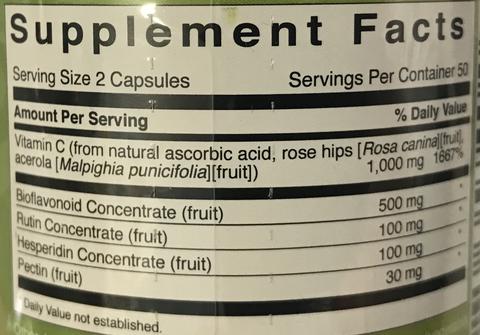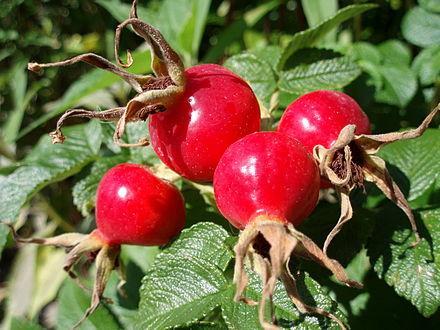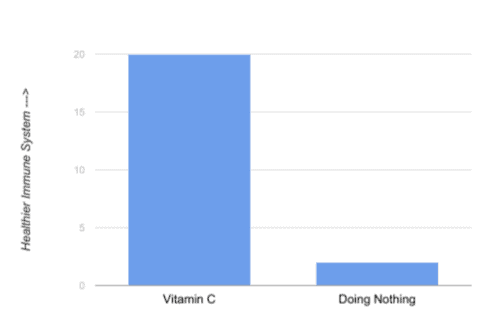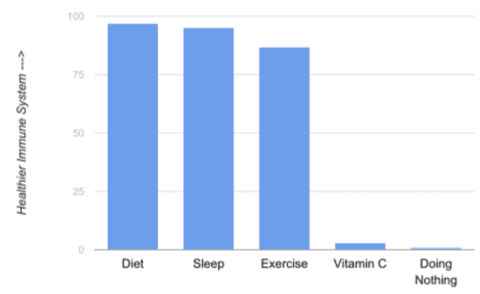It’s Heart Month and instead of the usual fish oil and cholesterol talk, we want to focus on antioxidants. As we were discussing this, though, we kept getting hung up on a very popular antioxidant, Vitamin C.
Both topics are typically so very exciting, I know. I know switching to a Vitamin C rant is a big letdown to so many of you, so we’ll talk about antioxidants next month, we promise.
In our opinion, Vitamin C isolate supplements are over-hyped and over-dosed. Hope you enjoy this rant!
We All LOOOOOVE Vitamin C
I don’t know of another supplement that’s as popular as Vitamin C. It’s a reliable, old friend that you can call up whenever you need. She’ll help you work through any ailment, give you energy, and protect you against all dangers.
Google “what is Vitamin C good for” and you will see probably about 1000 different indications. It’s a wonder drug… you wonder how the heck it can work for every disease!
Seriously though, we have this societal urge to look to Vitamin C as a savior for many health conditions, from the common cold to preventing or treating cancer.
We don’t want this conversation to be a debate about the merits of high dose Vitamin C supplementation in different conditions. We try to stick to quality when we talk about products, which we’ll dig in to with Vitamin C. But we also like to maintain a high level of integrity.
So our position here on Vitamin C, if I may set the stage, is that if someone wants to use Vitamin C for whatever reasons, they must know 1. exactly what you are getting and 2. the liabilities of that product.
Vitamin C Basics
I’ll do this in more detail in a blog article in the future, but this rant was too long to keep it all. Here’s the succint version:
- Ascorbic acid is the chemical name for Vitamin C.
- Vitamin C is associated with oranges because it’s found in many citrus plants, but oranges have a very low amount comparatively.
- Camu camu berries and acerola cherries are the richest sources of Vitamin C. They have 30-60 times the amount of an orange.
- We are one of VERY few animals that don’t make their own Vitamin C. Literally almost every other plant and animal make their own.
- Organ meats are good sources of Vitamin C, but it would be gross to eat liver for a cold.
Synthetic vs Natural Vitamin C
In many examples, a vitamin compound found in a food will differ from what we can create in the lab. Here’s a picture highlighting the difference between Vitamin C found in a food and the synthetically made Vitamin C:


There is none. I’m such a prankster. With Vitamin C, the synthetic and naturally occurring compound are bio-identical, which means they are literally the same exact thing.
This means if you took an orange and extract out the Vitamin C, it will have no additional benefit or quality over making it in a lab somewhere.
This is a good thing, as it is very expensive to extract it. Many people across the globe still suffer from Vitamin C deficiency, or scurvy, and cheaper is better as more people will have access to it.
When we talk about Vitamin C extracted from foods or made in a lab we are talking about vitamin isolates. This is the active compound ONLY, not the compound with the other healthy nutrients found in Vitamin C rich foods.
Ascorbic acid is synthesized by two main methods, the most notable is the Reichstein process. This uses corn syrup, acetone, and other wonderful ingredients to make ascorbic acid. One of the main suppliers of Vitamin C is China, where their corn syrup is from GMO corn.
Most people are surprised to hear about how “unnatural” their Vitamin C supplement is. It’s synthetic, yes, and comes from gross stuff, yes.
There are raw material concerns as there always is – some companies cut corners and there can be contaminants in Vitamin C products. But in general, whether naturally isolated or synthetic, it’s the same.
“Natural Vitamin C” Is A Lie
That being said, there is a TREMENDOUS push by supplement companies to falsely label their synthetic Vitamin C products as natural.
Here’s a great example of a label where that has happened. Pay attention to the Vitamin C line up top:

It says that Vitamin C comes from “natural ascorbic acid”, rose hips, and acerola. But it doesn’t.
To the average consumer (and supplement salesperson, probably), it would seem the Vitamin C in this product was squeezed out of those complicated sounding plants. It wasn’t. Not even close.
They just use plain ascorbic acid. They ***MAY*** add a few specs of rose hip or acerola powder, but in this situation, they didn’t.
Want to know what shady company that was? That was us.
Not us as in my staff and I, but the contract manufacturer we use for one of our products started doing it.
Since we are a bit uptight about these things, we caught it when it came in and we called and raised our voices, telling them they had to remove those mentions ASAP. We pulled the product and then ate chocolate due to the stress.
Why do this though? Why can’t we just say “Vitamin C 1,000mg” or “Ascorbic Acid 1,000mg”. Because by labeling it “natural” and using plant latin names it makes it look more sophisticated and mysterious than it actually is.
Even the “good guy” manufacturers get caught up in the desire to move a few more units by deceiving customers. This company rep said “ascorbic acid is identical to natural Vitamin C, so that’s why we called it natural.” Oy vey.It is crucial that we never rest and always challenge companies, even our Vitality Approved brands!
If you see the term “natural” vitamin C on 99.9% of products, they are outright lying. I would gladly like to be proven wrong, so if you see one send it our way and we’ll investigate!
It would be 10 times more expensive to use ascorbic acid that has been extracted from something like camu camu or acerola than it would be to just use synthetic ascorbic acid. If your Vitamin C is still $5-6 and it says “natural” that’s a big con-job right there.
REALLY be aware if they say their Vitamin C is natural from oranges. Why? Because it occurs in such small amounts in oranges. A 100 g orange yields 30 mg of Vitamin C.
To get a single 1000 mg tablet of Vitamin C, you’d need about 30 x 100g oranges to be dehydrated and processed.
I don’t get it, but I do. The perception here they are exploiting is that natural is automatically better. They want you to think natural Vitamin C is superior to that chemical “ascorbic acid.”
In reality, supplement companies are deceiving you, falsely labeling the product as “natural” and selling synthetic Vitamin C, which comes from the most unnatural ingredients and processes you can think of.
They do this to also give some false equivalence: natural Vitamin C is NOT the same as a whole food vitamin C. Isolates are MUCH different than the whole food.
Using one of my favorite analogies, Vitamin C (synthetic or isolated from natural sources) is like the steering wheel and foods rich in Vitamin C are the whole car. The steering wheel is critical, but you won’t get very far with it in many situations.
(A quick related aside… If you haven’t seen it yet, we wrote a blog article about the opposite phenomena which happens equally often.)
Those Rose Hips Do Lie
Some of the more savvy among us may say “well rose hips are a good source of Vitamin C and my product has rose hips!” Yes, you’re right.
Many synthetic Vitamin C products will contain rose hips. This is a smoke screen.
Again, they sprinkle in some rose hips with their synthetic ascorbic acid to give off the image of it being natural Vitamin C. You would need 46,000 mg of properly processed rose hip powder to yield a bit less than 500 mg of Vitamin C.
Basically, 200mg of rose hips – a relatively high dose for most formulations – has no Vitamin C.
Here’s a rose hip, in case you were wondering (I always was):

Supplement companies will add ingredients like Rose Hips to double down on their deceit, relying on consumers (and experts, for that matter) to not ask a simple question: “How much Vitamin C could that small amount of rose hips actually have?”
Vitamin C Biology aka We Take Too Much Vitamin C
If we chose to take Vitamin C products, I hope we now understand the difference between synthetic and natural (there is none). My next gripe with Vitamin C: people recommend WAY too much!
To figure out how much Vitamin C we should be using, we have to understand its absorption and excretion.
The absorption of Vitamin C in the gut is inversely related. This means if you take higher doses, you absorb less. If you take lower doses, you absorb more:
If you take 1000mg of Vitamin C, you are absorbing about 300-350mg. If you take 200mg of Vitamin C, you absorb almost all of it.
This is my biggest complaint against high dose Vitamin C supplements, probably because I’m the science/pharmacology nerd around here. By recommending high dose, we ignore a basic fact about our biology.
The more Vitamin C we take, the faster we get rid of it. High dose Vitamin C is poorly absorbed and quickly excreted until your body hits a “sweet spot” which could have been achieved by taking much less Vitamin C daily.
You don’t need a lot of Vitamin C. Studies have shown that taking as little as 10mg of daily Vitamin C is enough to prevent scurvy. Taking more will refill your Vitamin C stores, but it caps out. We recommend moderation in Vitamin C dosing.
As I think about this… it’s weird how the amount we would get from foods would be much less than 100mg at a time and we’d eat FAR less than 1000mg in a day with a rather healthy diet, isn’t it? It’s almost like a good diet is more than adequate to keep us healthy!
The Pro-Oxidant Effect
High doses aren’t just bad because we end up peeing them all out. There is a growing body of evidence saying high dose, isolate vitamins can be harmful.
A quick discussion about antioxidants. Oxidation is a natural state of things – they lose electrons and these compounds can do damage to other cells of our bodies.
An antioxidant gives back electrons, cleaning up the mess and keeping us healthy. Vitamin A, C, and E are common vitamins that have antioxidant effects.
If we take these supplements for their antioxidant effect, a benefit would be less cardiovascular events – strokes, heart attacks, etc. Theoretically, less people would get cancer as well. The end effect, hopefully, would be less disease and deaths.
Thankfully, that’s actually been studied pretty extensively. Isolated, synthetic antioxidant supplements Vitamin A, beta-carotene, C, and E do not prevent cardiovascular events, nor do they have impact on cancer risk.
What’s interesting is that there has been significant INCREASES in stroke risk by taking isolated Vitamin E in some of those studies. There is data that high dose Vitamin C can harm endurance athletes as well.
Further research has shown that there is dose related pro-oxidant effects of these vitamins. This means instead of cleaning up the oxidation, they make the problem worse.
The Brains Behind Vitamin C
This is another section that was super long, but I will definitely go into more detail in the future.
There are two people you should know when we talk about Vitamin C.
Dr. Szent-Gyorgi was one of the people to identify and isolate Vitamin C. In his studies, however, he found that using paprika (rich in Vitamin C) was superior to using synthetic Vitamin C isolate.
He’s the reason we know about Vitamin C and he was one of the first people to understand the role of the bioflavonoids in Vitamin C rich foods on our health. He received a Nobel Prize for his work on Vitamin C.
If Dr. Szent-Gyorgyi brought us Vitamin C, Linus Pauling, another Nobel Laureate (but not for Vitamin C), made it a 100 million dollar business.
The reason Vitamin C is so ubiquitous in our culture is because of the influence of Linus Pauling, in particular lots of straight up CRAZY theories and perspectives about Vitamin C and the benefits of megadosing with Vitamin C and other synthetic, isolated chemicals.
Here’s a great synopsis of all of his post-Nobel work on Vitamin C and how I feel about him:
Although Pauling’s megavitamin claims lacked the evidence needed for acceptance by the scientific community, they have been accepted by large numbers of people who lack the scientific expertise to evaluate them. Thanks largely to Pauling’s prestige, annual vitamin C sales in the United States have been in the hundreds of millions of dollars for many years. Pauling also played a role in the health food industry’s successful campaign to weaken FDA consumer protection laws. The Linus Pauling Institute that bears his name has evolved into a respectable organization. But Pauling’s irrational advice about supplements continues to lead people astray.
There is a big contrast between these two minds and Vitamin C. Szent-Gyorgyi promoted a moderate, “whole food” approach. Linus Pauling kinda went diva mode.
As a result, many unsubstantiated theories became mainstream and have persisted to this day, despite his own Linus Pauling Institute taking a more tempered stance with greater scientific rigor and understanding of Vitamin C.
The biggest, of which, is the role of Vitamin C in “boosting the immune system.”
Vitamin C and Immune Health
We hate being sick. We will do anything, it seems, to not get sick and the natural products industry knows it. Vitamin C is perfect for this, because it is difficult to overdose on, it’s cheap (so bigger profits), and has a low risk of side effects.
Vitamin C has been extensively studied in the common cold. It doesn’t help. It doesn’t help shorten the duration of a cold, decrease the severity, or prevent colds. It’s extremely well established, and it’s the truth. (That’s not to say we don’t have ways to naturally help with colds – zinc lozenges are one way to do so. Ask us about it!)
Vitamin C is found in immune cells and is utilized rapidly when we are ill. Yes, we use more of it, but it is difficult to deplete the stores of Vitamin C in our body, especially if we have a halfway decent diet that contains some Vitamin C.
Remember, all you need is 10mg a day to prevent deficiency, and it takes upwards of 84 days with NO Vitamin C before someone would not have enough.
“But I feel better when I drink orange juice or take those bright colored, flavored Vitamin C packets,” says the passionate consumer.
I agree! People take that stuff and report feeling better. This has nothing to do with the Vitamin C, but more to do with the fluids and sugar found in these products.
When we are sick, we typically drink alot less than normal, and most people don’t stay hydrated when they are healthy anyway. So ANY fluids help us feel better when we are sick. Orange juice, Emergen-C, and many chewable Vitamin C supplements have high doses of sugar. This will pep you up, for sure.
One of the reasons we look to Vitamin C for the cold is because we believe it “boosts” the immune system. The impact Vitamin C has to our immune health is negligible. Here’s what I think many supplement experts believe… They look at a chart like this:

“See! The Vitamin C column is bigger! That means it makes the immune system better!” Yes, I see it too. The data is showing that compared to doing nothing, the Vitamin C gives you a “healthier immune system.”
This is a common deceptive trick done in studies to make the results seem more important than they are. Always look at the scale, and try to compare it to other data when we can.
In reality, that chart is a zoomed in version of a bigger chart:

Vitamin C may impact “immune health” but it is not significant, especially when compared to interventions that ACTUALLY make our immune system healthier.
This is another reason why people who make recommendations need to be better at being experts. They should know how to analyze data and identify these games that are often played, thereby having a much more informed justification for their recommendations.
We probably will do another piece on boosting immune system, as it deserves its own rant. We like to say “immune optimization” and the best way you can optimize your immune health is with diet, exercise, and rest.
Woodstock Vitamins ALWAYS holds to the idea that isolated vitamins are NOT ideal in many situations – especially “filling in the gaps” in our diets to prevent disease.
You should be getting the majority of your vitamins from food, especially as it pertains to reducing the risk from oxidation and inflammation.
We believe that isolated, synthetic vitamins are typically taken at too high of a dose for too long, and we fear (based on data) that they will do harm while consumers are misled about their benefits.
Whole Food Vitamin C
When people are looking for a Vitamin C or any other antioxidant, we always go to whole food first. There are drastic differences that should be discussed, so let’s highlight them here.
First, you will not get near the megadoses of isolate Vitamin C when using a whole food product. Typically, a whole food C has less than 200mg. That’s good though, since we’ll absorb almost all of it and we won’t excrete it instantly.
Secondly, when done correctly, Vitamin C will be one of many nutrients that will be present. With true whole food C, you’ll find bioflavonoids that have many important roles in our wellness.
Finally, they will be more expensive. Synthetic Vitamin C is dirt cheap. A low quality Vitamin C product costs big box guys like a buck to make.
A good quality Vitamin C isolate could be $4-6 to manufacture. A true whole food will be more money, for sure.
We’d definitely rather you eat, but a whole food Vitamin C is a convenient, consistent way to get good doses of bioflavonoids, C, and other healthy compounds you may not be exposed to in your diet.
“C” Ya Later
We started off by stating we don’t like to get into debates about therapeutics as it pertains to natural products.
There are unique scenarios where synthetic or isolated Vitamin C in a high dose may be needed. Those are typically rare situations where high doses are used for a very limited time, and patients are closely monitored.
All we ask is that you not get fooled by an industry so set on misrepresenting products and their benefits.
We hope we have armed you with lots of great information about what Vitamin C products really are. To recap:
- Vitamin C supplements are typically synthetic isolates, sometimes misrepresented as natural when they are far from it.
- They list great stuff like rose hips but they’re only sprinkling in tiny amounts.
- They are recommended at doses that far exceed our body’s ability to absorb and retain them.
We’ve gotten hooked on megadosing based on claims starting essentially from a single point (Linus). There is ample data showing that isolated, high dose Vitamin C supplement really won’t help for the most common reasons people use them.
Finally, these products could potentially be harmful over the long term via pro-oxidation effects.
Search out true whole food products if you are looking for Vitamin C supplementation, but know the Vitamin C portion will be MUCH lower dose than what you are used to seeing, and the Vitamin C itself takes a back seat to the other ingredients, in particular, the bioflavonoids.
To Be Continued…
I hope this was enlightening for all you loyal customers! Unless something really urgent comes up, next month we plan on ranting about antioxidants.
Vitamin C is an important antioxidant, but the forms found in synthetic vitamins actually have been shown to do more harm than good.
The true solution you are searching for are foods rich in antioxidants and Vitamin C. If this isn’t possible in your busy day, you know where to find us for help on your journey to make healthier, high quality decisions!
Just trying to keep it real…

Neal Smoller, PharmD
Owner, Pharmacist, Big Mouth



